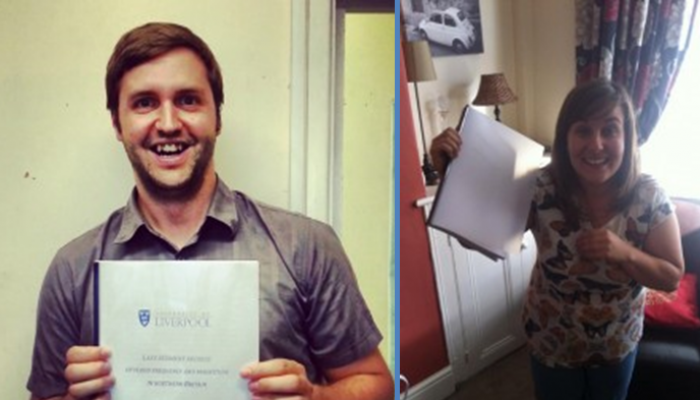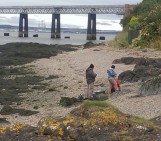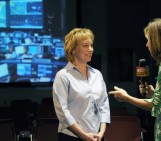
Laura and I both submitted our theses at the end of September after four years of intense work. We felt there’d be some value (nostalgic to ourselves, hopefully useful to others) in putting together some tips of our own now that we can look back on our achievements.
There are loads of brilliantly-written and extremely useful posts providing advice on the pastoral side of undertaking a PhD, such as developing your relationship with your supervisor and tips for improving your scientific writing. Laura put together a comprehensive series of posts entitled ‘making the post of your PhD’ earlier this year on our blog: here, here and here, and I wrote a piece describing my first experiences of submitting a paper for peer-review and being invited to review my first paper.
So this is the first of a series that aims to offer more specific pieces of advice hopefully relevant to PhD students at any stage of their research:
Attend conferences from an early stage
This advice is repeated time and again and we both agree it is absolutely true. I (Daniel) was a member of the British Society for Geomorphology (BSG) for the duration of my PhD and attended three of their annual meetings. The thriving community comprises academics at various stages of their careers, all of whom were supportive and engaged at the meetings and very willing to provide feedback and suggestions regarding on-going PhD research. I also met fellow PhD students who have become good friends outside of our academic lives.
I’ve also attended some international conferences, including INQUA in 2011 and the EGU General Assembly the past three years. I can truthfully say that advice and feedback I received having presented a poster or given a talk improved the thesis I submitted in September.
There are mixed views on whether presenting a poster or giving a talk is ‘better’ as a PhD student. I would say they are different; at a large, international conference, why not submit an abstract for both? Almost all PhD student’s will have sufficient data to do this. (Note: there’s usually a non-refundable abstract processing charge for the big conferences). I can vouch that opportunities do directly arise from presenting at conferences: during the coffee break after presenting at EGU2013 I was invited to give a talk at the PAGES Human-Climate-Ecosystem Interactions meeting in Leuven, Belgium early this year, which has now led to my involvement in the Aquatic Transitions PAGES Working Group.
Applying for external funding
If you’ve read any academic job listing you will have almost certainly noticed ‘evidence of successful external funding applications’ listed under the Essential job specifications. Obtaining this evidence from an early stage is clearly invaluable to those seeking to forge a career in academia, but I believe it offers evidence of succinct technical writing ability that will look good on anyone’s CV.
The key here is that there is money available for Postgraduate geoscientists. In fact, many societies and organisations have dedicated funding streams for Postgraduates, both for supporting attendance at national and international conferences as well as funding field work or equipment. As one example, information on BSG PG grants is here. There may be Departmental or University-wide pots to fund equipment acquisition, for example. My experience of the BSG underlined an organisation keen to support Postgraduate research and the BSG Research sub-committee who evaluate grant applications were continuously emphasising the funds that were available. Success rates for large grants are pretty low, but are often much higher at PG level – why not take advantage of this?
It is surprising the amount of work one can do with £1000 or £2000 and a good idea. It may allow your PhD research to expand along an existing pathway, perhaps allowing an additional field season to be completed, or it could be something more supplementary. Furthermore, it offers opportunities to do some fun stuff of your own choice during your PhD!
One personal example was the award of £2000 to design, build and install a set of sediment traps in Brotherswater (a small lake in the English Lake District). This was not in my original PhD plan but some interesting literature sparked the idea that the data could be really useful for my PhD. I had a chat with my supervisor, we found a suitable funding call and put an application together that was successful. In the end, the sediment traps yielded some superb data that greatly aided the interpretation of sediment cores extracted from the lake.
It’s also worth highlighting here that I’m aware of instances where PhD students take up their position with zero funding attached for field work or lab expendables, with the aim of submitting applications to finance data collection. Obtaining external grants is obviously not guaranteed; as a result, I’d be hesitant to take up a PhD that had no support budget attached. I know funding is tight at all levels and PhD positions are extremely competitive but it seems to me that academics advertising PhD positions without any financial support to collect the data is at best unfair.
Hands-on approach: learn how to make figures with your supervisor!
This is a practical point potentially relevant at any stage. There are numerous software packages for statistical analysis and graphical presentation available to geoscientists (this is a good list of OpenSource software from John Stevenson, Edinburgh), some being discipline-specific, and others of much broader interest, and I felt comfortable with a number of these programs through regular use during my PhD that I rarely asked for assistance to ‘make a graph’.
When it came to submitting my first paper to a peer-reviewed journal, however, I learned the hard way that being able to ‘make graphs’ is in no way the equivalent to creating visually effective diagrams suitable for publication. In the end, my supervisor sat with me for several hours one night and we revised (substantially!) the majority of my diagrams. I learned more in that time than I had in my many years as a student.
As a result, I would strongly encourage others to find a similar opportunity with their supervisors or a willing Postdoc – ideally prior the submission stage! Perhaps they are preparing a manuscript for publication; would they let you sit with them while they produce their final diagrams? I think such experience would be invaluable.
Get writing early
I firmly believe my writing has improved considerably from the beginning of my PhD. I also believe this is largely due to regular practice, as well as a few helpful tips from supervisors and colleagues along the way. Improving one’s technical capability is obviously useful for the thesis and papers that come out of the PhD research, but also for conference abstracts with rigid word limits, funding and job applications. Blogging definitely helps and there are a number of Twitter-based ‘encouragement groups’ to help get those words down: #AcaDoWriMo and #AcWriMo are two examples.
An important personal point is that I found describing my data in text form prompted me to notice many patterns and sparked ideas of possible interpretations that had not previously occurred to me, despite looking at the raw numbers or even in graphical form for days or weeks. Essentially, the act of writing about the data triggered many connections to be made. While on one hand this may alter your detailed paper or chapter plan, it can improve the final product and potentially guide other avenues of your PhD research – if you’ve started the writing early enough! This observation that may be entirely personal; I’d be keen to hear the views of others.
We’ll certainly be writing a follow-up or two with other tidbits. In the meantime, I hope this is useful advice and by all means leave a comment or get in touch via Twitter or email if you have any thoughts or queries.



